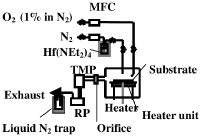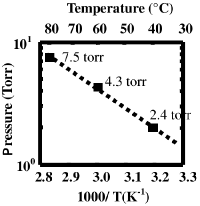Hafnium oxide deposition (CVD): Difference between revisions
Jump to navigation
Jump to search
No edit summary |
No edit summary |
||
| Line 1: | Line 1: | ||
The equipment required for this process are a CVD and a plasma cleaner for removing impurities after the Hafnium oxide deposition | The equipment required for this process are a CVD and a plasma cleaner for removing impurities after the Hafnium oxide deposition | ||
[[ | Since HfCl<sub>4</sub> is a solid salt at room temperature, we need to first create a liquid precursor, and use [https://www.intechopen.com/chapters/63679 direct liquid injection] for using it in our CVD. | ||
The process is based on a [https://download.libresilicon.com/papers/HafniumOxide.pdf Japanese paper] and requires a complex precursor. | |||
[[ | The synthesis of the [[Hf precursor TDEAH (Hf(NEt2)4)]] is so complex, that it needs its own page. | ||
=== | ===Step 1=== | ||
Synthesize the precursor [[Hf precursor TDEAH (Hf(NEt2)4)]] accordingly. | |||
===Step 2=== | |||
[[File:HFO2_CVD_setup.png|200px]] | |||
[[File:Pressure_TDEAH.png|200px]] | |||
===Links=== | ===Links=== | ||
Revision as of 14:29, 12 October 2022
The equipment required for this process are a CVD and a plasma cleaner for removing impurities after the Hafnium oxide deposition
Since HfCl4 is a solid salt at room temperature, we need to first create a liquid precursor, and use direct liquid injection for using it in our CVD.
The process is based on a Japanese paper and requires a complex precursor.
The synthesis of the Hf precursor TDEAH (Hf(NEt2)4) is so complex, that it needs its own page.
Step 1
Synthesize the precursor Hf precursor TDEAH (Hf(NEt2)4) accordingly.
Step 2
Links
Study HfO2 formation: https://iopscience.iop.org/article/10.1149/MA2005-02/13/547/pdf
A Japanese paper how they grew it with an LPCVD: http://www.trichemical.com/topics/Manuscript%20revisions.pdf

